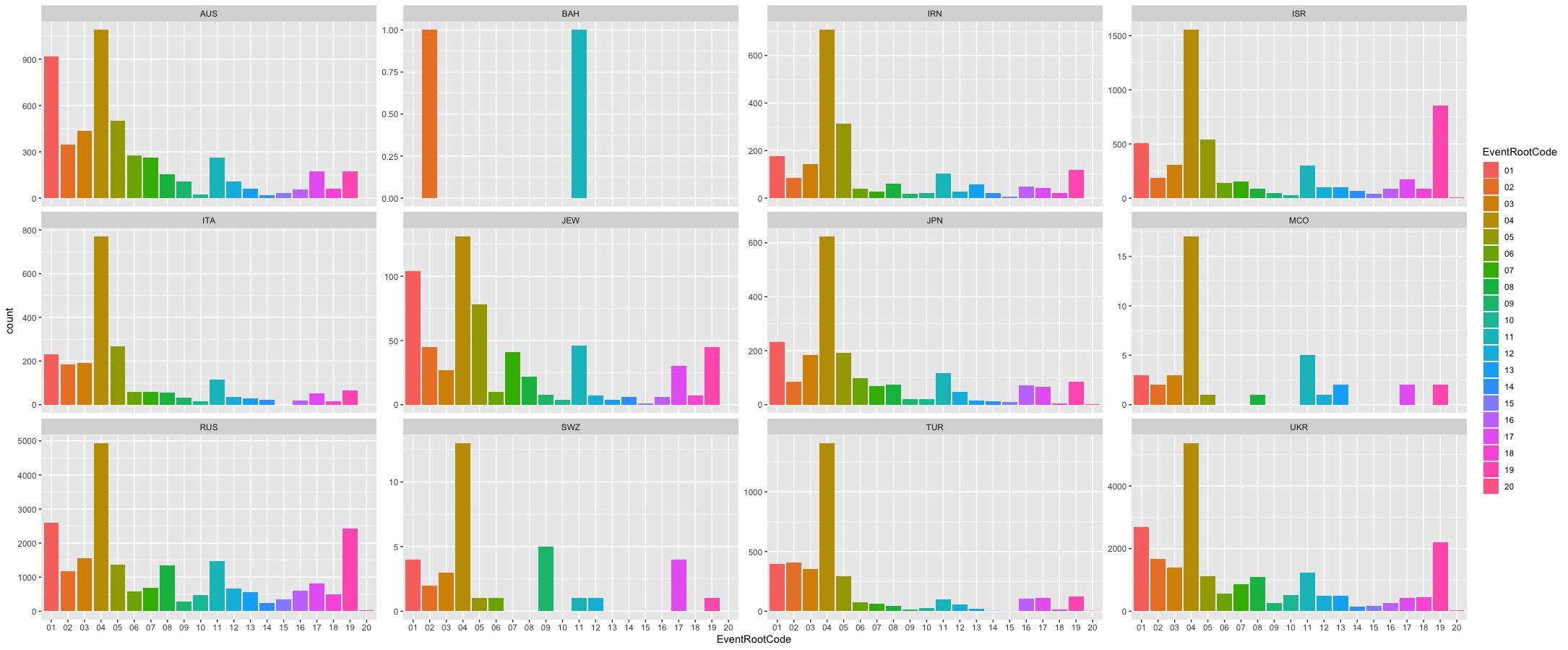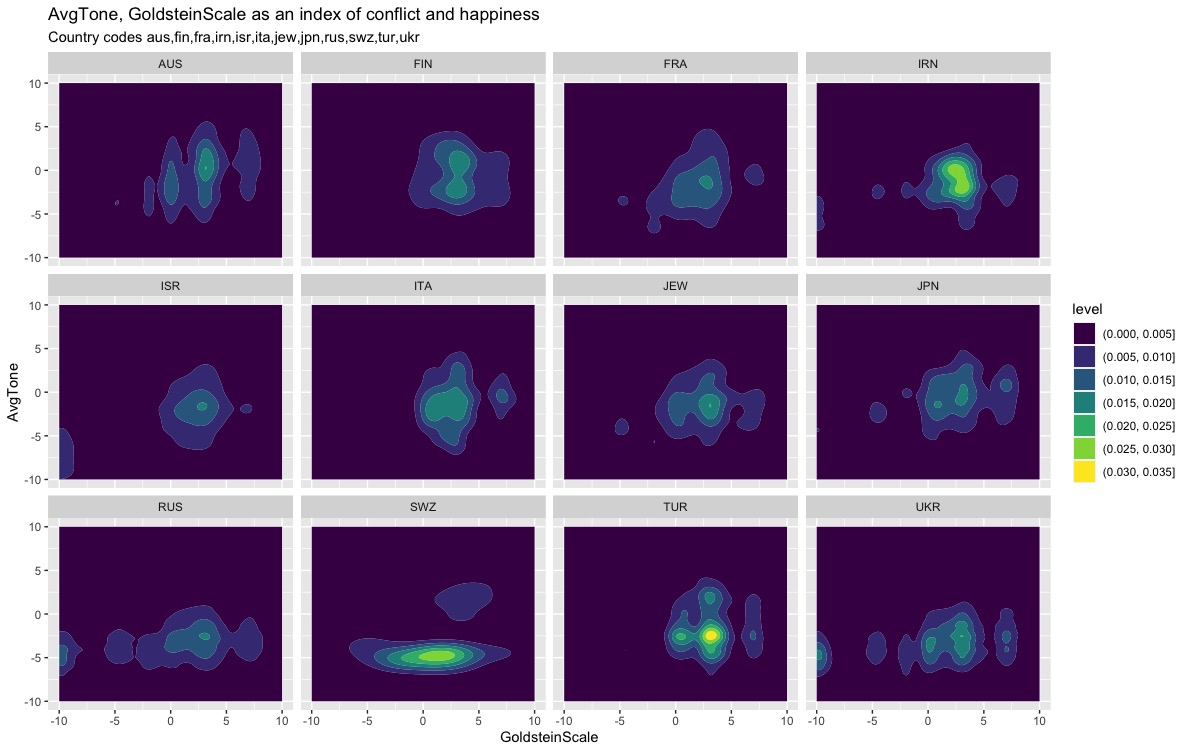What is all this? Using data analysis on GDELT data
- Use the gdettools script to load as zip files from the GDELT
- Use this jar file to load directly from bigquery then use the Mongodb Data api to load to atlas
- First create an .env file to control access to the Atlas Cluster via the Data Api
mongo-api-key=YOUR API KEY HERE
mongo_database=mdg22
mongo_source_collection=eventscsvmongo_database=mdg22
mongo_source_collection=eventscsv
mongo_datasource=mongoworld
- Connects to the collection with the events and find the last GlobalEventId added
- Calls BigQuery to retrieve a set of events with a greater GlobalEventId (they increase with time)
- Reads from the results and converts into an array of data class
- Using a Kotlin data class and Ktor send a insert_many request via the Data Api
- A Trigger in Atlas responds to the insert by adding calculated fields that such as converting Long and Lat to valid GeoJson
Loading directly from BigQuery and loading to Atlas with the Atlas Data Api
On the Atlas side the Data Api can be turned on very simply after the standard creation of an authentication method 
val bigquery = BigQueryOptions.getDefaultInstance().service
val queryConfig = QueryJobConfiguration.newBuilder(
"select $fieldList from `gdelt-bq.gdeltv2.events` where GLOBALEVENTID > $lastId limit 2000"
) // Use standard SQL syntax for queries.
// See: https://cloud.google.com/bigquery/sql-reference/
.setUseLegacySql(false)
.build()
Field list matches a Kotlin data class limit is obtained from Atlas with the Data Api using Ktor
There is a basic setup to use Google Cloud, you have to enable a service to your account, so for this you will need the Cloud Scheduler, PubSub, and BigQuery I have a more detailed description at Mongo's Data API is Cloud Ready To upload the built code you need to run the "build" task in Gradlew (./gradlew build) and then from you need to remove the 'MongoHackathon2022-1.0-SNAPSHOT-all.jar' file then run the deploy.sh
# Deploying to GCP
# This script uploads jar for Cloud build then creates a PubSub taoke that can be linked to
# the Cloud scheduler
cd /Users/freda/Downloads/MongoHackathon2022
gcloud functions deploy fn-gdelt-update --entry-point hackathon.PubSub --runtime java11 --memory 512MB --trigger-topic hackathon --source build/libs
Reshaping data - Tying an update by the Data Api to a Realm Function that reshapes the GDELT event documents
exports = function(changeEvent) {
/*
Access a mongodb service: Then use the aggregation to reshape the data for this collection
*/
const aggregation = [
{$match: {
points: {
$exists: 0
}
}}, {$addFields: {
actorCodes: {
$concatArrays: [
[
'$Actor1Code'
],
[
'$Actor2Code'
]
]
},
geoCodes: {
$concatArrays: [
[
[
'$ActionGeo_Long',
'$ActionGeo_Lat'
]
],
[
[
'$Actor1Geo_Long',
'$Actor1Geo_Lat'
]
],
[
[
'$Actor2Geo_Long',
'$Actor2Geo_Lat'
]
]
]
}
}}, {$addFields: {
geoCodes: {
$map: {
input: '$geoCodes',
as: 'a',
'in': {
$map: {
input: '$$a',
as: 'b',
'in': {
$convert: {
input: '$$b',
to: 'double',
onError: ''
}
}
}
}
}
}
}}, {$addFields: {
geoCodes: {
$filter: {
input: '$geoCodes',
as: 'b',
cond: {
$and: [
{
$ne: [
{
$arrayElemAt: [
'$$b',
0
]
},
''
]
},
{
$ne: [
{
$arrayElemAt: [
'$$b',
1
]
},
''
]
}
]
}
}
},
news: {
$regexFind: {
input: '$sourceurl',
regex: '//([^/]+)'
}
}
}}, {$addFields: {
points: {
$map: {
input: '$geoCodes',
'in': {
geometry: {
type: 'Point',
coordinates: '$$this'
}
}
}
},
news: {
$arrayElemAt: [
'$news.captures',
0
]
}
}}, {$project: {
geoCodes: 0
}}, {$merge: {
into: 'eventscsv',
on: '_id',
whenMatched: 'replace',
whenNotMatched: 'discard'
}}]
const collection = context.services.get("mongoworld").db("mgd22").collection("eventscsv");
const response = collection.aggregate( aggregation );
library( dply)
library( ggplot2)
library( mongolite)
hackDB = mongo( collection="eventscsv", db="mgd22", url=mongoworld)
Where mongoworld = mongodb+srv://yyyy:xxxxxxxxx@mongoworld.rgeiy.mongodb.net/test?retryWrites=true&w=majority

mongodata %>% ggplot( aes( x=GoldsteinScale, y=AvgTone, color=AvgTone)) + geom_point() + scale_color_gradient(low="blue", high="red") +labs(title="AvgTone v GoldsteinScale with trend line") + stat_smooth( method="lm", col="red")

mongodata %>% group_by( GoldsteinScale) %>% ggplot( aes( x=EventRootCode, y=GoldsteinScale, fill=EventRootCode)) + geom_boxplot() + labs(title="GoldsteinScale by EventRootCode")
mongodata %>% ggplot( aes( x=GoldsteinScale, y=AvgTone)) + geom_density2d_filled() +ylim(-10,10) + labs(title="AvgTone, GoldsteinScale as an index of conflict and happiness",subtitle = "Country codes aus,fin,fra,irn,isr,ita,jew,jpn,rus,swz,tur,ukr") + facet_wrap(~Actor1Code, ncol=4)

